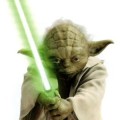Just about anyone old enough to remember 1977 can hear the fanfare that introduces a Twentieth Century Fox film and almost instinctively recall that thrilling moment when the blackened screen lit up with blue letters reading "A long time ago, in a galaxy far, far away." "Star Wars" was an old-fashioned adventure, borrowing liberally from the traditional western, but, un-traditionally, [was] set in outer space: It gave us Jedi knights dueling with light sabers, spacecraft that made the jump to hyper-space (once the navi-computers were set), a long-haired and volatile Wookiee co-pilot, eccentric 'droids' or robots, white-armored storm troopers and a spiritual concept called "The Force:" Screen veteran Sir Alec Guinness played venerable Jedi Obi-Wan Kenobi, the guide and mentor to fresh-faced young Luke Skywalker, played by Mark Hamill. The characters are well-known today, but writer-director George Lucas admits until opening weekend 30 years ago, he was unsure that many people would get to see them. "We were in 32 theaters. I felt that science fiction usually does pretty well in the first week so we were kind of expecting to do okay; but then it just went crazy. There were lines around the block and people trying to get in. They immediately had to start releasing it in more theaters just because there was such a demand for it," [he says.] Subtitled "Episode Four: A New Hope," it was the first in a cycle that would span six films; and Lucas says it succeeded in creating what he calls 'a modern mythology'. "It makes me feel very good. The whole idea was to create a modern myth that families could watch together and provoke certain questions between kids and their parents that would allow them to ask some of the more interesting questions in life and have some enjoyment - give a young person some inspiration and something to feel good about," he says. "A lot of it was just happy circumstance, you know .like anything else that clicks on levels you did n-o-t expect," says Mark Hamill, who was 25 when he first played Luke Skywalker, one of his first feature film roles. His career since spanned movies, TV and the Broadway stage; but Hamill says "Star Wars" scenes like the rowdy cantina at Mos Eisley Spaceport ("a wretched hive of scum and villainy") stood out even amid the costumed chaos of the film set. "It 'pops' in the screenplay. People forget that it was all on the page .everything was. You talk about that cantina sequence: it immediately arrests you in the screenplay because it's one of those movies where you're waiting for 'the monster' and then out of nowhere you go through a door and it's not just one monster, it's thousands of monsters." "It did not behave itself, that movie .it was a great script," says Carrie Fisher, who co-starred as spunky Princess Leia. Her career path took her behind the scenes to become a leading Hollywood screenwriter and, in the anniversary panel discussion at the Motion Picture Academy, she recalls wondering how Lucas would be able to film his "Star Wars" vision. "I read it out loud with a friend of mine who is an actor, Miguel Ferrer, and it was extraordinary and I wanted to do it .I wanted to play Han Solo, but since that part wasn't available, I wanted to do it to see how he would do that. I'd never seen anything like what the script was talking about. I thought it would be a film I would really like to see and that is all I knew. I thought 'I'll want to see this and it will be like this groovy cult film.' Far, far away from suffering the fate of a midnight 'cult' favorite, that original "Star Wars" became the second-highest grossing film in history ("Titanic" is number one). It also helped make George Lucas very, very wealthy and he believes its unexpected success has had a lasting effect on film entertainment. "It diversified the audience for films. They used to make films for a very small group of people and now they realize that there is room for movies for all ages. They kind of relegated children's films to Disney, but now all of the studios are doing it. We now have art films that we never had when we were doing "Star Wars." I think it has broadened the whole arena of cinema in the United States," he says. The thirtieth anniversary screening and discussion of "Star Wars" launched this year's edition of the Motion Picture Academy series titled "It's Great To Be Nominated," spotlighting films that received the most [Oscar] nominations, but did not win Best Picture. At the 1978 ceremony that Award went to "Annie Hall." "Star Wars" had ten nominations and won six Academy Awards, including one to John Williams for his original musical score.

Hollywood Celebrates 30 Years of "Star Wars"
To hear audio for this text, and to learn the vocabulary sign up for a free LingQ account.
